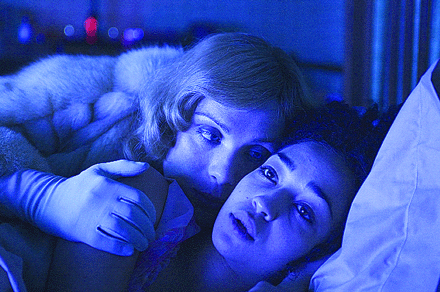Neal Jordan’s dithering adaptation of Patrick McCabe’s trannie-terrorism novel
Irish auteur Neil Jordan’s adaptation of Patrick McCabe’s Booker Prize-shortlisted novel “Breakfast on Pluto” fills out this fall’s boomlet of gay period dramas, joining “Capote” and the forthcoming “Brokeback Mountain” in revisiting the postwar decades through an ostensibly queer subjectivity.
Jordan has always veered between highly achieved works such as “Mona Lisa” and turkeys like “Interview with the Vampire.” Less cohesive than his 1997 treatment of McCabe’s “The Butcher Boy,” “Breakfast” recapitulates the gender-fuck-plus-terrorism formula of “The Crying Game,” with dispiriting results. The film’s main purpose would seem to be clinching its star Cillian Murphy’s transition, not from male to female but from supporting to headline billing, in tandem with his roles in this year’s “Batman Begins” and “Red Eye.”
Though premised as the fable of a storm-tossed waif, from our first glimpse of Patrick Braden—a lanky transvestite deflecting catcalls from hardhats as she sashays past a construction site, wheeling a pram—there’s scarcely a doubt in our minds that this pile of sass can fend for herself just fine.
Flash back to the saga’s beginning in the late 1950s. In a picturesque hamlet near the Irish Republic’s volatile northern border, a newborn is abandoned by a shadowy blonde on the doorstep of Father Bernard (Liam Neeson), a gentle giant of chronically anxious mien. Digitally concocted robins flit about the parsonage and wisecrack on the action in English-subtitled chirps, declaring the sort of forced whimsy the film is liberally larded with.
The orphan is consigned to Ma Braden, a Guinness-swilling termagant pub-keeper, who storms in on Patrick 10 years later to find him in full, fetching drag. She damns the day she sheltered the bastard, ending Patrick’s ignorance of his origins and awakening an irrepressible desire to know his birth mother. As Patrick sheds his skin to become “Kitten”—versus the novel’s “Pussy”—roiling foster family and school, he is buoyed by friendship with the dark n’ lovely Charlie (Ruth Negga), her scruffy beau Irwin (Laurence Kinlan), and their pal Laurence (Seamus Reilly), who has Down’s Syndrome.
One day a sympathetic neighbor lets drop that Kitten’s real mother was Father Bernard’s ex-housekeeper, the beautiful Eily Bergin, last glimpsed in a crowded London street. Then Kitten gets blown sideways into a romance with Billy Hatchett (Gavin Friday), who fronts a glam rock outfit, the Mohawks, that happens to be aligned with the Irish Republican Army. Billy installs Kitten in his mom’s disused trailer home, which she enthusiastically sets to redecorating, but after a car-bomb kills Laurence, in pique she chucks the Mohawks’ cache of rifles into a quarry. IRA hitmen show up to blow Kitten’s brains out, but her unconscious mention of Irwin turns their suspicions on him instead.
At last Kitten hoofs it for London, determined to locate Eily Bergin among the anonymous millions. The scenery change cues Jordan to indulge in his trademark, often misbegotten penchant for surrealism lite. First Kitten takes refuge in a playground teepee, waking to find herself conscripted to entertain squealing tots as a furry-costumed “Womble.” She’s then rescued from a near-tussle with brawling doxies in Piccadilly by Bryan Ferry, as a psycho out cruising for whores to throttle with a silken bolo. Kitten escapes his clutches with a spritz of cheap perfume to the eyes, but the air of menace is defused by one’s fugitive hope for an impromptu rendition of “Virginia Plain.”
Next comes Jordan’s cinematic alter ego Stephen Rea as a sad-sack magician, who inveigles Kitten into being sawed in half onstage. Under his hypnosis, the blubbering gamine flings herself at strangers, imagining each one to be his mother. They go on convulsing cabaret audiences with this shtick until Kitten is sprung by Charlie, visiting London with Irwin to get an abortion.
Their reappearance heralds another upsurge of violence, however. While slow-dancing at a nightclub with a soldier just back from a tour in Ulster, Kitten survives an IRA terror bombing. As the only Irish trannie in the area, naturally Scotland Yard fingers her as the culprit. Sprinkling caricature atop fantasy, Jordan interrupts her jailhouse interrogation with a pseudo-camp vignette depicting a leather-jumpsuited Kitten immobilizing an armed guerrilla cell with blasts of Chanel No. 5.
Suffice to say that en route to the inevitable encounter with her birth mother—found raising a young, gender-normative son also named Patrick—much else transpires. But at 135 minutes, the over-plotted “Breakfast” outstays its welcome by at least half an hour. During a scene of the Mohawks flailing away mid-concert, a sharp sensation of ennui took hold when I realized the picture was still far from over and little of import was likely to occur.
While perhaps no other director could have made this film, “Breakfast” scans as a warmed-over pastiche of Jordan’s previous efforts, plus assorted others. The anxiety of Almodóvar’s influence is especially strong, as when Kitten dons chic mourning weeds at Laurence’s burial, in a straight rip from “All About My Mother.” Jordan also toys with the anticlericalism of “Bad Education,” but his view of religion’s influence on both individual psychology and social relations is far more benign.
What, finally, of Kitten? The character extends Jordan’s career-long project of revising “inherited cinematic images of Irish masculinity,” as scholar Marcia Landy has noted. And referring to the source novel, McCabe has implied that Kitten could be a figure for Ireland itself, in the vein of Dark Rosaleen or Cathleen Ni Houlihan. This allegorical basis may help explain why, despite her too-human filial yearning, Kitten seems so unreal.
For once, it’s best to wait for lunch.
gaycitynews.com



































